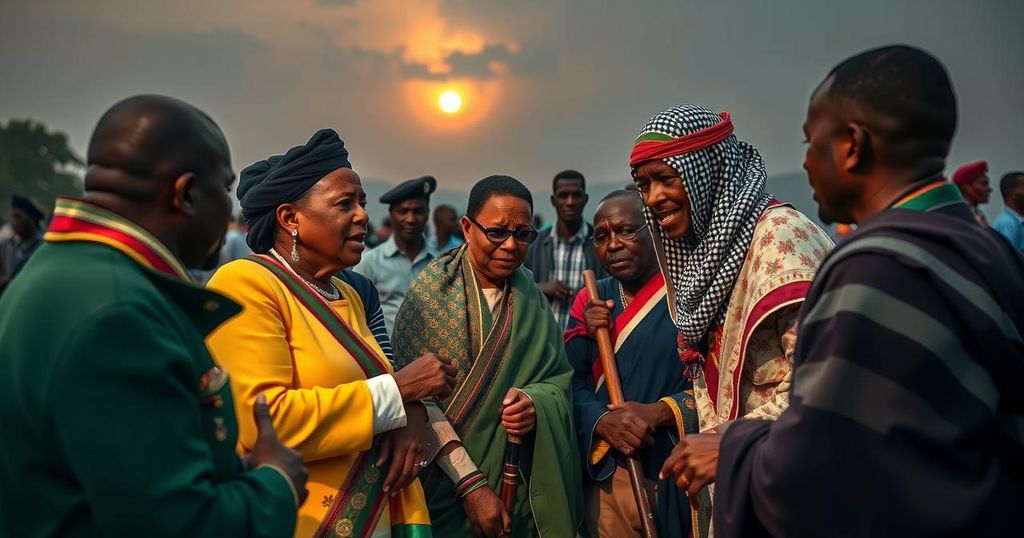Sudan’s civil war, intensified by foreign intervention, has led to tens of thousands of casualties and a severe humanitarian crisis. The UAE and other regional powers are allegedly supporting warring factions, complicating efforts for a peaceful resolution. Amidst accusations of war crimes and starvation tactics against civilians, international diplomatic focus remains insufficient, prompting calls for stronger action from the UK and others involved.
The escalating civil war in Sudan has drawn intensified scrutiny regarding the involvement of foreign powers amid the ongoing humanitarian crisis. Since the outbreak of conflict in April, it is reported that tens of thousands of individuals, primarily civilians, have lost their lives. A recent allegation from the United Arab Emirates (UAE) accused the Sudanese Armed Forces (SAF) of bombing its ambassador’s residence in Khartoum, prompting a denial from the SAF that attributed the attack to the rival paramilitary group, the Rapid Support Forces (RSF), which allegedly has support from the UAE. Both factions are believed to be committing war crimes, significantly fueled by foreign military support. A troubling report from UN-appointed experts has revealed that starvation tactics are being used against approximately 25 million civilians, with 10 million people displaced and the rapid spread of diseases amidst a dire hunger crisis. Although the autumn harvest may provide temporary relief, the long-term outlook remains grim as both warring parties target humanitarian workers who had previously engaged in feeding the hungry. The brutal conflict underscores a troubling dynamic where the aspirations of the Sudanese people for a democratic transition, following the ousting of a dictator, are being compromised by the vested interests of foreign governments. The UAE’s connections to the RSF, under the leadership of Mohamed Hamdan Dagalo (also known as Hemedti), have been critiqued despite the UAE’s denials of supporting the group in light of credible allegations of arms shipments. In contrast, the SAF, led by Abdel Fattah al-Burhan, garners support from Saudi Arabia and Egypt, both of which seek strategic advantages in the region, including access to valuable Red Sea ports and natural resources. The complex interplay of these alliances has been likened to a Middle Eastern conflict being played out in African territory. Despite the gravity of the situation in Sudan, international diplomatic efforts appear largely focused on the ongoing conflicts in the wider Middle Eastern region. A recent meeting between the UAE’s leader, Mohamed bin Zayed Al Nahyan, and U.S. President Biden only briefly mentioned Sudan. Historical patterns indicate that the U.S. has not translated its supportive rhetoric into actionable and sustained strategic planning or involvement. Former President Trump’s administration was primarily invested in pressuring Sudan’s transitional government towards recognizing Israel, rather than addressing the immediate crises at hand. Attempts to initiate informal negotiations aimed at reconciling the warring generals have failed, suggesting that a resolution in Sudan is improbable without cooperation from key foreign actors such as the UAE, Saudi Arabia, and Egypt. The need for significant pressure from the United States appears absent, prompting calls for the UK, which currently holds a leadership role in the UN Security Council regarding this matter, to take more decisive action. Meanwhile, external demonstrations against the UAE’s involvement, such as cultural boycotts and protests by public figures, may serve to influence a change in the UAE’s international posture rapidly.
The civil conflict in Sudan has roots in a struggle for power following the ousting of long-time dictator Omar al-Bashir in 2019. The current factions—the Sudanese Armed Forces (SAF) and the Rapid Support Forces (RSF)—have engaged in violence leading to civilian casualties and a massive humanitarian crisis, exacerbated by the involvement of foreign powers. The UAE, Saudi Arabia, and Egypt are reportedly backing these factions for strategic advantages related to regional geopolitics and resources. The situation has worsened with alarming accusations regarding the use of starvation tactics against vulnerable populations and the targeting of humanitarian efforts. International attention remains divided, with diplomatic dealings overshadowed by other ongoing conflicts in the Middle East.
The involvement of foreign powers in Sudan’s civil war has catalyzed a humanitarian disaster, with civilians bearing the brunt of violence amid strategic geopolitical maneuvering. The consequent starvation and the dislocation of millions reflect a deeper crisis, highlighting the moral implications of foreign interference in domestic conflicts. As the situation continues to deteriorate, it becomes increasingly urgent for the international community to recalibrate its approach towards Sudan to prioritize humanitarian considerations and the support of democratic aspirations.
Original Source: www.theguardian.com






